Blue Demon: Difference between revisions
m →Gallery |
Flashmagic (talk | contribs) No edit summary |
||
| Line 8: | Line 8: | ||
|family=[[Blue Demon Jr.]] (son), [[Flama Solar]](nephew) | |family=[[Blue Demon Jr.]] (son), [[Flama Solar]](nephew) | ||
|maestro=[[Rolando Vera]] | |maestro=[[Rolando Vera]] | ||
|birthdate=April 24, 1922 - Villa de García, Nuevo León | |birthdate=[[April 24]], [[1922]] - [[Villa de García]], [[Nuevo León]] | ||
|obituarydate=December 16, 2000 - Mexico City | |obituarydate=[[December 16]], [[2000]] - [[Mexico City]] | ||
|debut=March 31, 1948 - Laredo, Texas, USA | |debut=[[March 31]], [[1948]] - [[Laredo]], [[Texas]], [[USA]] | ||
|height= | |height= | ||
|weight= | |weight= | ||
| Line 20: | Line 20: | ||
== Biography == | == Biography == | ||
<font face="Verdana"> | <font face="Verdana"> | ||
When it comes to popularity, Blue Demon is, along with El Santo, the biggest mainstream lucha superstar Mexico ever had. | When it comes to popularity, Blue Demon is, along with [[El Santo]], the biggest mainstream lucha superstar [[Mexico]] ever had. | ||
Demon was born on | Demon was born on [[April 24]], [[1922]] in [[Villa de García]], a small town in [[Nuevo León]], though he was registered in [[Los Rodriguez]], [[Coahuila]], a town located near the border of [[Coahuila]] and [[Nuevo León]]. He was the fifth kid of a 12 children family, all maintained by their father, who worked as a agriculturist. When Demon was still very young, his parents moved to [[Rinconada]], where he attended school. He dropped out of it, as he saw no point in studying because there wasn't a lot of future in his little town. After an unsuccessful try to become a musician, he moved to [[Monterrey]] to live with his uncles and his aunt. | ||
He got a job at the railway station, and there he met the brother of his friend Franklin Hernández - the lucha legend Rolando Vera. Vera saw potential in the kid and trained him for several non-combat sports at a local gym. Demon was a huge youngster, and his hands were especially big. After being told about lucha and despite the fact that he didn't really know what was going on the business or how was it like, the young Demon knew he wanted to be a luchador like his mentor. | He got a job at the railway station, and there he met the brother of his friend Franklin Hernández - the lucha legend [[Rolando Vera]]. Vera saw potential in the kid and trained him for several non-combat sports at a local gym. Demon was a huge youngster, and his hands were especially big. After being told about lucha and despite the fact that he didn't really know what was going on the business or how was it like, the young Demon knew he wanted to be a luchador like his mentor. | ||
After extensive physical training, Demon tried amateur wrestling and ended up undefeated with a 8-0 record, and then he tried freestyle wrestling as well. | After extensive physical training, Demon tried amateur wrestling and ended up undefeated with a 8-0 record, and then he tried freestyle wrestling as well. | ||
One day a promoter spoke to Vera about sending some wrestlers for a lucha program in Laredo, Texas, and without really expecting it, the future Blue Demon had his debut on March 31, 1948, wrestling under his real name and defeating Chema López. | One day a promoter spoke to Vera about sending some wrestlers for a lucha program in [[Laredo]], [[Texas]], and without really expecting it, the future Blue Demon had his debut on [[March 31]], [[1948]], wrestling under his real name and defeating [[Chema López]]. | ||
After that fight, Vera had a good idea for him. He told his young protegé that he'd wear a blue mask with silver decorations, blue trunks and blue boots, and that his new name was going to be "Blue Demon". The disciple had no objection about it because he knew that Rolando's ideas were always good. Since that day, he decided that the Blue mask would become his heart and soul. | After that fight, Vera had a good idea for him. He told his young protegé that he'd wear a blue mask with silver decorations, blue trunks and blue boots, and that his new name was going to be "Blue Demon". The disciple had no objection about it because he knew that Rolando's ideas were always good. Since that day, he decided that the Blue mask would become his heart and soul. | ||
He obviously started off wrestling in Monterrey while still keeping a normal life when not under the hood, as he never stopped working in the railway station. In his debut as Blue Demon he scored a win over Benny Arcilla. | He obviously started off wrestling in [[Monterrey]] while still keeping a normal life when not under the hood, as he never stopped working in the railway station. In his debut as Blue Demon he scored a win over [[Benny Arcilla]]. | ||
EMLL president Salvador Lutteroth once sent one of his talent scouts, Jesus Lomelí, to give a look to some American lady wrestlers that were performing on Nuevo Laredo, however Jesús arrived a day earlier so he attended a card in Monterrey. When Demon went to get his payoff as usual, the Arena Monterrey promoter Jesús Garza Hernández gave him something that Lomelí had left there for him: it was a recommendation letter so he could go to wrestle to Mexico City anytime he wanted to. | [[EMLL]] president [[Salvador Lutteroth]] once sent one of his talent scouts, [[Jesus Lomelí]], to give a look to some American lady wrestlers that were performing on [[Nuevo Laredo]], however Jesús arrived a day earlier so he attended a card in [[Monterrey]]. When Demon went to get his payoff as usual, the [[Arena Monterrey]] promoter [[Jesús Garza Hernández]] gave him something that Lomelí had left there for him: it was a recommendation letter so he could go to wrestle to [[Mexico City]] anytime he wanted to. | ||
He told Vera about that letter and they intensified the training, and Vera also taught him how to behave when in Mexico City. Demon's Mexico City debut was on September of 1948. His first match was at the old Arena Mexico against Ciclón Veloz, and he lost in two straight falls... both by being disqualified! He really got over as a "rudo" after that fight and he caused a sudden impact in the Mexico City wrestling scene. He decided to stay in Mexico City, so he left his job at the railway station for good, and his wife and his little son moved to the capital with him. | He told Vera about that letter and they intensified the training, and Vera also taught him how to behave when in [[Mexico City]]. Demon's [[Mexico City]] debut was on [[September]] of [[1948]]. His first match was at the old [[Arena Mexico]] against [[Ciclón Veloz]], and he lost in two straight falls... both by being disqualified! He really got over as a "rudo" after that fight and he caused a sudden impact in the [[Mexico City]] wrestling scene. He decided to stay in [[Mexico City]], so he left his job at the railway station for good, and his wife and his little son moved to the capital with him. | ||
Around 1952 he was already fighting versus top wrestlers of the promotion in a regular basis. On November 7 of that same year, the arguably most important match in the history of lucha libre was hold - El Santo defeated Black Shadow (Alejandro Cruz Ortíz) in a mask vs. mask match. Blue Demon, who was seconding Shadow on that match, promised he'd avenge the mask loss of his "brother", because on the wrestling world, Shadow and Demon were billed as real-life brothers. | Around [[1952]] he was already fighting versus top wrestlers of the promotion in a regular basis. On [[November 7]] of that same year, the arguably most important match in the history of lucha libre was hold - [[El Santo]] defeated [[Black Shadow]] (Alejandro Cruz Ortíz) in a mask vs. mask match. Blue Demon, who was seconding Shadow on that match, promised he'd avenge the mask loss of his "brother", because on the wrestling world, Shadow and Demon were billed as real-life brothers. | ||
Demon turned full-time tecnico and that probably was the wisest business decision he ever took, as he started feuding with the top rudo in Mexico - El Santo. They feuded all over Mexico (Demon teamed with Shadow, while Santo's partner was Gory Guerrero) and made a lot of money together. On August, 1953, Demon and Santo had their first singles match ever and Demon surprisingly defeated Santo in two straight falls, which gave him the right to challenge Santo for the NWA Welterweight title he owned in a match that happened on September 25, 1953 at La Arena Coliseo. In what is usually referred as the most important match from his career, Demon defeated Santo in three falls to win that Welterweight title, which he'd keep for 4 years and a half, until Karloff Lagarde defeated him the 31st of January of 1958. | Demon turned full-time tecnico and that probably was the wisest business decision he ever took, as he started feuding with the top rudo in [[Mexico]] - [[El Santo]]. They feuded all over [[Mexico]] (Demon teamed with Shadow, while [[Santo]]'s partner was [[Gory Guerrero]]) and made a lot of money together. On [[August]], [[1953]], Demon and [[Santo]] had their first singles match ever and Demon surprisingly defeated [[Santo]] in two straight falls, which gave him the right to challenge [[Santo]] for the [[NWA Welterweight title]] he owned in a match that happened on [[September 25]], [[1953]] at La [[Arena Coliseo]]. In what is usually referred as the most important match from his career, Demon defeated [[Santo]] in three falls to win that Welterweight title, which he'd keep for 4 years and a half, until [[Karloff Lagarde]] defeated him the [[January 31|31st of January]] of [[1958]]. | ||
Other of Demon's classic encounters was the draw between Los Hermanos Shadow (Black Shadow & Blue Demon) and the rudísimo team of Cavernario Galindo and El Santo, which was voted the 1953 Match of The Year in Mexico by the media. | Other of Demon's classic encounters was the draw between [[Los Hermanos Shadow]] ([[Black Shadow]] & Blue Demon) and the rudísimo team of [[Cavernario Galindo]] and [[El Santo]], which was voted the [[1953]] Match of The Year in [[Mexico]] by the media. | ||
Some reports say that in 1955, Blue Demon captured the National Welterweight Title, but this has never been either confirmed or denied as there's a hole on the title history of that belt during the 1945-to-1956 period. What is known for a fact, is that on April 4, 1962 captured that same title defeating Karloff Lagarde in Mexico City. He would lose that title six months later, and he wouldn't taste gold again until 07/30/1976, when he defeated Mano Negra in a match for Mexican Welter title that Fishman had vacated; and it was Fishman who defeated Demon to regain the title on February 27, 1977. | Some reports say that in [[1955]], Blue Demon captured the National Welterweight Title, but this has never been either confirmed or denied as there's a hole on the title history of that belt during the [[1945]]-to-[[1956]] period. What is known for a fact, is that on [[April 4]], [[1962]] captured that same title defeating [[Karloff Lagarde]] in [[Mexico City]]. He would lose that title six months later, and he wouldn't taste gold again until [[July 30|07/30]]/[[1976]], when he defeated Mano Negra in a match for Mexican Welter title that Fishman had vacated; and it was [[Fishman]] who defeated Demon to regain the title on [[February 27]], [[1977]]. | ||
Demon's first serious injury was on July, 1957 during a fight against El Espectro in Tampico, Tamps. After a wicked head-first impact on the ringpost he fractured his skull and during seven months, he was out wearing an ortophedic mechanism that kept his neck immobile. | Demon's first serious injury was on [[July]], [[1957]] during a fight against El [[Espectro]] in [[Tampico]], [[Tamps]]. After a wicked head-first impact on the ringpost he fractured his skull and during seven months, he was out wearing an ortophedic mechanism that kept his neck immobile. | ||
After his return, Demon had his first fallout with EMLL. There was a problem with the transport, as without previous announcement he was sent to different places in a truck instead of being sent by plane. After many miles he became really frustrated and when he was in El Paso, TX, visiting his old friend Gory Guerrero, he had two fights for the promotion he was starting there and earned enough money to return to Mexico by plane. The promoter, Gorila Ramos, and the EMLL board of directives were upset with Demon for fighting for Guerrero without permission. The board, Lutteroth included, had a meeting with Demon probably to tell him about the punishment they had for him, but before they could even speak, he told them that he was very grateful to them for what they had done for him in the past but that he was leaving. | After his return, Demon had his first fallout with [[EMLL]]. There was a problem with the transport, as without previous announcement he was sent to different places in a truck instead of being sent by plane. After many miles he became really frustrated and when he was in [[El Paso]], [[TX]], visiting his old friend [[Gory Guerrero]], he had two fights for the promotion he was starting there and earned enough money to return to [[Mexico]] by plane. The promoter, Gorila Ramos, and the [[EMLL]] board of directives were upset with Demon for fighting for Guerrero without permission. The board, Lutteroth included, had a meeting with Demon probably to tell him about the punishment they had for him, but before they could even speak, he told them that he was very grateful to them for what they had done for him in the past but that he was leaving. | ||
So, pretty much like Santo, Guerrero and the other big stars of his era, he became a free agent and wrestled all over Mexico, New York, several Southern U.S. cities and Latin America, which allowed him to have more free time to devote to the parallel acting career he was just starting. Many of those films were productions he co-starred with Santo. Santo turned tecnico in 1963 and despite their on-screen partership, they were still considered intense rivals until 1968, which was the first time they teamed. | So, pretty much like [[Santo]], [[Gory Guerrero|Guerrero]] and the other big stars of his era, he became a free agent and wrestled all over [[Mexico]], [[New York]], several Southern [[U.S.]] cities and [[Latin America]], which allowed him to have more free time to devote to the parallel acting career he was just starting. Many of those films were productions he co-starred with [[Santo]]. [[Santo]] turned tecnico in [[1963]] and despite their on-screen partership, they were still considered intense rivals until [[1968]], which was the first time they teamed. | ||
Demon, who never left lucha, suffered his most important injury during 1965. During a match against Cavernario Galindo in Oaxaca, Demon fell through the ropes outside the ring and due to the collision on the floor one of his blood vessels broke. Despite the fact that the doctor told him not to eat anything, Demon had dinner and a few minutes later he lost conscience, fell off the stairs and fractured his skull again. He was other whole year out but he eventually returned to the ring. | Demon, who never left lucha, suffered his most important injury during [[1965]]. During a match against [[Cavernario Galindo]] in [[Oaxaca]], Demon fell through the ropes outside the ring and due to the collision on the floor one of his blood vessels broke. Despite the fact that the doctor told him not to eat anything, Demon had dinner and a few minutes later he lost conscience, fell off the stairs and fractured his skull again. He was other whole year out but he eventually returned to the ring. | ||
From then on and until his retirement, he kept wrestling all over the places mentioned earlier, and he made several other films. Also, around the mid 70s he helped in the training of several young wrestlers at the Arena Mexico gym. One of those wrestlers is Ringo Mendoza. He eventually opened his own gym as well, the "Blue Demon Gym" located at Colonia Moctezuma in Mexico City. | From then on and until his retirement, he kept wrestling all over the places mentioned earlier, and he made several other films. Also, around the mid 70s he helped in the training of several young wrestlers at the [[Arena Mexico]] gym. One of those wrestlers is [[Ringo Mendoza]]. He eventually opened his own gym as well, the "Blue Demon Gym" located at [[Colonia Moctezuma]] in [[Mexico City]]. | ||
In 1989 Demon decided that it was time to say goodbye and he started his retirement tour. His Arena Mexico retirement saw him, his son Blue Demon Jr. and Ringo Mendoza go over the team of Emilio Charles Jr., Pirata Morgan and Satanico. His Tijuana retirement was a Promociones Mora match in which he, his son and Alcatraz (one of the sons of Benjamin Mora Sr) went over Hijo del Gladiador, Kahoz and Leon Chino. But the big "retirements" were in the place that saw him mature as a wrestler - Monterrey. He wasn't actually going to wrestle a retirement match in Monterrey but the promoters had quite a big and espectacular retirement planned for him, an offer he obviously accepted. On July 30, 1989 he unmasked one of the biggest legends of the 70s - El Rayo de Jalisco. As if that wasn't enough, Demon's last match on August 22 was another mask vs. mask match, this time he took the hood of El Matematico, a quite popular wrestler in the 70s and 80s as well. | In [[1989]] Demon decided that it was time to say goodbye and he started his retirement tour. His [[Arena Mexico]] retirement saw him, his son [[Blue Demon Jr.]] and [[Ringo Mendoza]] go over the team of [[Emilio Charles Jr.]], [[Pirata Morgan]] and [[Satanico]]. His [[Tijuana]] retirement was a [[Promociones Mora]] match in which he, his son and [[Alcatraz]] (one of the sons of [[Benjamin Mora Sr.]]) went over [[Hijo del Gladiador]], [[Kahoz]] and [[Leon Chino]]. But the big "retirements" were in the place that saw him mature as a wrestler - [[Monterrey]]. He wasn't actually going to wrestle a retirement match in [[Monterrey]] but the promoters had quite a big and espectacular retirement planned for him, an offer he obviously accepted. On [[July 30]], [[1989]] he unmasked one of the biggest legends of the 70s - El [[Rayo de Jalisco]]. As if that wasn't enough, Demon's last match on [[August 22]] was another mask vs. mask match, this time he took the hood of [[El Matematico]], a quite popular wrestler in the 70s and 80s as well. | ||
On January of 1996, AAA ran a very controversial angle involving Demon. Blue Demon and Ray Mendoza were being honored in the ring for their careers when Pierroth came to the ring, rip up Demon's diploma and attacked him. This angle wouldn't be so weird to see in the US, but this was something never seen before in Mexico and it gave the already over Pierroth way more heel heat to the point that crowds anywhere would be about to riot just after he appeared in the entrance way. Due to the success of this angle, on August 1998 they ran a similar angle again. He and his son were presenting a little kid with a mask, and then rising superstar Abismo Negro ran in, attacked the junior and then he tried to piledrive the senior, though in the end the junior saved his father from such a lethal move. This angle was supposed to skyrocket both Demon Jr. and Abismo's careers, however the only man whose career got skyrocketed was Abismo. | On January of [[1996]], [[AAA]] ran a very controversial angle involving Demon. Blue Demon and [[Ray Mendoza]] were being honored in the ring for their careers when [[Pierroth]] came to the ring, rip up Demon's diploma and attacked him. This angle wouldn't be so weird to see in the US, but this was something never seen before in [[Mexico]] and it gave the already over [[Pierroth]] way more heel heat to the point that crowds anywhere would be about to riot just after he appeared in the entrance way. Due to the success of this angle, on [[August]] [[1998]] they ran a similar angle again. He and his son were presenting a little kid with a mask, and then rising superstar [[Abismo Negro]] ran in, attacked the junior and then he tried to [[piledrive]] the senior, though in the end the junior saved his father from such a lethal move. This angle was supposed to skyrocket both [[Blue Demon Jr.|Demon Jr.]] and [[Abismo Negro|Abismo]]'s careers, however the only man whose career got skyrocketed was [[Abismo Negro|Abismo]].. | ||
On October 27, 2000, EMLL held the first "Leyenda Azul" tournament at Arena México, in honor of Blue Demon. Blue Panther defeated in the finals of the elimination match to win the trophy (which was actually a belt). Also, Demon was presented with a medal by the late Cavernario Galindo's son. | On [[October 27]], [[2000]], [[EMLL]] held the first "[[Leyenda Azul]]" tournament at [[Arena México]], in honor of Blue Demon. [[Blue Panther]] defeated in the finals of the elimination match to win the trophy (which was actually a belt). Also, Demon was presented with a medal by the late [[Cavernario Galindo]]'s son. | ||
Blue Demon, Alejandro Muñoz Moreno, died on December 16, 2000 around 11:45 AM, at age 78. Later on the day, he had a funeral service at the funerary Lopez García, located at Versalles street in Colonia Juarez. Many personalities of the cinema and lucha world (including Hombre Bala, Pompín, Nygma, El Dollar, Fantasma, Charles Bronson Mexicano, Black Shadow, Roberto "Güero" Rangel, Huracán Ramirez, Ringo Mendoza and Bestia Salvaje) attended the funeral service. He was buried a day later, around 2:00 PM at the Panteón Parque Memorial, in Naucalpan, Mexico City. | Blue Demon, Alejandro Muñoz Moreno, died on [[December 16]], [[2000]] around 11:45 AM, at age 78. Later on the day, he had a funeral service at the funerary Lopez García, located at Versalles street in Colonia Juarez. Many personalities of the cinema and lucha world (including [[Hombre Bala]], [[Pompín]], [[Nygma]], [[El Dollar]], [[Fantasma]], [[Charles Bronson Mexicano]], [[Black Shadow]], [[Roberto "Güero" Rangel]], [[Huracán Ramirez]], [[Ringo Mendoza]] and [[Bestia Salvaje]]) attended the funeral service. He was buried a day later, around 2:00 PM at the Panteón Parque Memorial, in [[Naucalpan]], [[Mexico City]]. | ||
After traveling on the Mexico City subway (Metro Polero station) he had a heart attack in the streets of Victoria and Insurgentes Norte. He liked to travel alone, and used the subway regularly as he didn't like taxis and he couldn't drive at his age. Blue Demon Jr. said to the media that he was called and he could see his father still alive and took him home, but he died in his arms while he was getting medical services. He was survived by his wife Gregoria "Goyita" Lomelí, his daughter Marla, his sons Alejandro and Blue Demon Jr., and his seven grandchildren. | After traveling on the [[Mexico City]] subway (Metro Polero station) he had a heart attack in the streets of [[Victoria]] and [[Insurgentes Norte]]. He liked to travel alone, and used the subway regularly as he didn't like taxis and he couldn't drive at his age. [[Blue Demon Jr.]] said to the media that he was called and he could see his father still alive and took him home, but he died in his arms while he was getting medical services. He was survived by his wife Gregoria "Goyita" Lomelí, his daughter Marla, his sons Alejandro and [[Blue Demon Jr.]], and his seven grandchildren. | ||
Demon was a man that always kept in shape. He woke up between 6-7 AM every day and he went to the gym almost every day (he was in fact returning from the gym when he died) and he had never had any heart problems in the past. | Demon was a man that always kept in shape. He woke up between 6-7 AM every day and he went to the gym almost every day (he was in fact returning from the gym when he died) and he had never had any heart problems in the past. | ||
Demon's legacy is still alive, not only because we have all the memories, as Blue Demon Jr. is an active professional wrestler. Like Blue Demon himself said: "If the silver legend of Santo can continue, the blue legend will continue as well!". Adios Blue Demon. | Demon's legacy is still alive, not only because we have all the memories, as [[Blue Demon Jr.]] is an active professional wrestler. Like Blue Demon himself said: "If the silver legend of [[Santo]] can continue, the blue legend will continue as well!". Adios Blue Demon. | ||
</font> | </font> | ||
| Line 102: | Line 102: | ||
{{astart}} | {{astart}} | ||
{{aline|??/??/??|hair|[[Blue Demon]]|[[Jorge Allende]]|unknown}} | {{aline|??/??/??|hair|[[Blue Demon]]|[[Jorge Allende]]|unknown}} | ||
{{aline|??/??/??|mask|[[Blue Demon]]|[[Moloch]]|Plaza de Toros Monumental - Monterrey, N.L.}} | {{aline|??/??/??|mask|[[Blue Demon]]|[[Moloch]]|[[Plaza de Toros Monumental]] - [[Monterrey]], [[N.L.]]}} | ||
{{aline|??/05/18|hair|[[Blue Demon]]|[[Baby Olson]]|unknown}} | {{aline|??/[[May 18|05/18]]|hair|[[Blue Demon]]|[[Baby Olson]]|unknown}} | ||
{{aline|53/11/27|hair/beard|[[Blue Demon]]|[[Tony Borne]]|unknown}} | {{aline|[[1953|53]]/[[November 27|11/27]]|hair/beard|[[Blue Demon]]|[[Tony Borne]]|unknown}} | ||
{{aline|54/03/12|hair|[[Blue Demon]]|[[Cavernario Galindo]]|Arena Coliseo - Mexico City}} | {{aline|[[1954|54]]/[[March 12|03/12]]|hair|[[Blue Demon]]|[[Cavernario Galindo]]|[[Arena Coliseo]] - [[Mexico City]]}} | ||
{{aline|55/03/12|beard|[[Blue Demon]]|[[Conde Giuseppe Daidone]]|Arena Coliseo - Mexico City}} | {{aline|[[1955|55]]/[[March 12|03/12]]|beard|[[Blue Demon]]|[[Conde Giuseppe Daidone]]|[[Arena Coliseo]] - [[Mexico City]]}} | ||
{{aline|71/12/03|mask|[[Blue Demon]]|[[Espectro II]]|Auditorio de Tijuana - Tijuana, Baja California}} | {{aline|[[1971|71]]/[[December 3|12/03]]|mask|[[Blue Demon]]|[[Espectro II]]|[[Auditorio de Tijuana]] - [[Tijuana]], [[Baja California]]}} | ||
{{aline|79/12/02|mask|[[Blue Demon]]|[[Máquina Salvaje]]|Palacio de los Deportes - Mexico City}} | {{aline|[[1979|79]]/[[December 2|12/02]]|mask|[[Blue Demon]]|[[Máquina Salvaje]]|[[Palacio de los Deportes]] - [[Mexico City]]}} | ||
{{aline|89/07/30|mask|[[Blue Demon]]|[[Rayo de Jalisco]]|Plaza de Toros Monumental - Monterrey, N.L.}} | {{aline|[[1989|89]]/[[July 30|07/30]]|mask|[[Blue Demon]]|[[Rayo de Jalisco]]|[[Plaza de Toros Monumental]] - [[Monterrey]],[[ N.L.]]}} | ||
{{aline|89/08/27|mask|[[Blue Demon]]|[[Matemático]]|Plaza de Toros Monumental - Monterrey, N.L.}} | {{aline|[[1989|89]]/[[August 27|08/27]]|mask|[[Blue Demon]]|[[Matemático]]|[[Plaza de Toros Monumental]] - [[Monterrey]], [[N.L.]]}} | ||
{{aline|89/[[September 6|09/06]]|hair (1)|[[Blue Demon]]|[[Matemático]]|Arena México - Mexico City}} | {{aline|[[1989|89]]/[[September 6|09/06]]|hair (1)|[[Blue Demon]]|[[Matemático]]|[[Arena México]] - Mexico City}} | ||
{{aend|<b>(1)</b> Triangle match with Rayo de Jalisco}} | {{aend|<b>(1)</b> Triangle match with [[Rayo de Jalisco]]}} | ||
== Gallery == | == Gallery == | ||
Revision as of 21:13, 8 October 2007
Profile
| Blue Demon | |||||||||||||||||||||||||||||
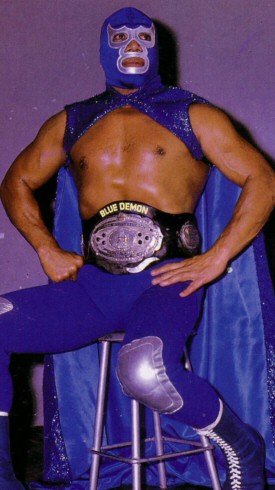 |
|
||||||||||||||||||||||||||||
| Wrestling Observer Hall Of Fame Member |
|---|
Biography
When it comes to popularity, Blue Demon is, along with El Santo, the biggest mainstream lucha superstar Mexico ever had.
Demon was born on April 24, 1922 in Villa de García, a small town in Nuevo León, though he was registered in Los Rodriguez, Coahuila, a town located near the border of Coahuila and Nuevo León. He was the fifth kid of a 12 children family, all maintained by their father, who worked as a agriculturist. When Demon was still very young, his parents moved to Rinconada, where he attended school. He dropped out of it, as he saw no point in studying because there wasn't a lot of future in his little town. After an unsuccessful try to become a musician, he moved to Monterrey to live with his uncles and his aunt.
He got a job at the railway station, and there he met the brother of his friend Franklin Hernández - the lucha legend Rolando Vera. Vera saw potential in the kid and trained him for several non-combat sports at a local gym. Demon was a huge youngster, and his hands were especially big. After being told about lucha and despite the fact that he didn't really know what was going on the business or how was it like, the young Demon knew he wanted to be a luchador like his mentor.
After extensive physical training, Demon tried amateur wrestling and ended up undefeated with a 8-0 record, and then he tried freestyle wrestling as well.
One day a promoter spoke to Vera about sending some wrestlers for a lucha program in Laredo, Texas, and without really expecting it, the future Blue Demon had his debut on March 31, 1948, wrestling under his real name and defeating Chema López.
After that fight, Vera had a good idea for him. He told his young protegé that he'd wear a blue mask with silver decorations, blue trunks and blue boots, and that his new name was going to be "Blue Demon". The disciple had no objection about it because he knew that Rolando's ideas were always good. Since that day, he decided that the Blue mask would become his heart and soul.
He obviously started off wrestling in Monterrey while still keeping a normal life when not under the hood, as he never stopped working in the railway station. In his debut as Blue Demon he scored a win over Benny Arcilla.
EMLL president Salvador Lutteroth once sent one of his talent scouts, Jesus Lomelí, to give a look to some American lady wrestlers that were performing on Nuevo Laredo, however Jesús arrived a day earlier so he attended a card in Monterrey. When Demon went to get his payoff as usual, the Arena Monterrey promoter Jesús Garza Hernández gave him something that Lomelí had left there for him: it was a recommendation letter so he could go to wrestle to Mexico City anytime he wanted to.
He told Vera about that letter and they intensified the training, and Vera also taught him how to behave when in Mexico City. Demon's Mexico City debut was on September of 1948. His first match was at the old Arena Mexico against Ciclón Veloz, and he lost in two straight falls... both by being disqualified! He really got over as a "rudo" after that fight and he caused a sudden impact in the Mexico City wrestling scene. He decided to stay in Mexico City, so he left his job at the railway station for good, and his wife and his little son moved to the capital with him.
Around 1952 he was already fighting versus top wrestlers of the promotion in a regular basis. On November 7 of that same year, the arguably most important match in the history of lucha libre was hold - El Santo defeated Black Shadow (Alejandro Cruz Ortíz) in a mask vs. mask match. Blue Demon, who was seconding Shadow on that match, promised he'd avenge the mask loss of his "brother", because on the wrestling world, Shadow and Demon were billed as real-life brothers.
Demon turned full-time tecnico and that probably was the wisest business decision he ever took, as he started feuding with the top rudo in Mexico - El Santo. They feuded all over Mexico (Demon teamed with Shadow, while Santo's partner was Gory Guerrero) and made a lot of money together. On August, 1953, Demon and Santo had their first singles match ever and Demon surprisingly defeated Santo in two straight falls, which gave him the right to challenge Santo for the NWA Welterweight title he owned in a match that happened on September 25, 1953 at La Arena Coliseo. In what is usually referred as the most important match from his career, Demon defeated Santo in three falls to win that Welterweight title, which he'd keep for 4 years and a half, until Karloff Lagarde defeated him the 31st of January of 1958.
Other of Demon's classic encounters was the draw between Los Hermanos Shadow (Black Shadow & Blue Demon) and the rudísimo team of Cavernario Galindo and El Santo, which was voted the 1953 Match of The Year in Mexico by the media.
Some reports say that in 1955, Blue Demon captured the National Welterweight Title, but this has never been either confirmed or denied as there's a hole on the title history of that belt during the 1945-to-1956 period. What is known for a fact, is that on April 4, 1962 captured that same title defeating Karloff Lagarde in Mexico City. He would lose that title six months later, and he wouldn't taste gold again until 07/30/1976, when he defeated Mano Negra in a match for Mexican Welter title that Fishman had vacated; and it was Fishman who defeated Demon to regain the title on February 27, 1977.
Demon's first serious injury was on July, 1957 during a fight against El Espectro in Tampico, Tamps. After a wicked head-first impact on the ringpost he fractured his skull and during seven months, he was out wearing an ortophedic mechanism that kept his neck immobile.
After his return, Demon had his first fallout with EMLL. There was a problem with the transport, as without previous announcement he was sent to different places in a truck instead of being sent by plane. After many miles he became really frustrated and when he was in El Paso, TX, visiting his old friend Gory Guerrero, he had two fights for the promotion he was starting there and earned enough money to return to Mexico by plane. The promoter, Gorila Ramos, and the EMLL board of directives were upset with Demon for fighting for Guerrero without permission. The board, Lutteroth included, had a meeting with Demon probably to tell him about the punishment they had for him, but before they could even speak, he told them that he was very grateful to them for what they had done for him in the past but that he was leaving.
So, pretty much like Santo, Guerrero and the other big stars of his era, he became a free agent and wrestled all over Mexico, New York, several Southern U.S. cities and Latin America, which allowed him to have more free time to devote to the parallel acting career he was just starting. Many of those films were productions he co-starred with Santo. Santo turned tecnico in 1963 and despite their on-screen partership, they were still considered intense rivals until 1968, which was the first time they teamed.
Demon, who never left lucha, suffered his most important injury during 1965. During a match against Cavernario Galindo in Oaxaca, Demon fell through the ropes outside the ring and due to the collision on the floor one of his blood vessels broke. Despite the fact that the doctor told him not to eat anything, Demon had dinner and a few minutes later he lost conscience, fell off the stairs and fractured his skull again. He was other whole year out but he eventually returned to the ring.
From then on and until his retirement, he kept wrestling all over the places mentioned earlier, and he made several other films. Also, around the mid 70s he helped in the training of several young wrestlers at the Arena Mexico gym. One of those wrestlers is Ringo Mendoza. He eventually opened his own gym as well, the "Blue Demon Gym" located at Colonia Moctezuma in Mexico City.
In 1989 Demon decided that it was time to say goodbye and he started his retirement tour. His Arena Mexico retirement saw him, his son Blue Demon Jr. and Ringo Mendoza go over the team of Emilio Charles Jr., Pirata Morgan and Satanico. His Tijuana retirement was a Promociones Mora match in which he, his son and Alcatraz (one of the sons of Benjamin Mora Sr.) went over Hijo del Gladiador, Kahoz and Leon Chino. But the big "retirements" were in the place that saw him mature as a wrestler - Monterrey. He wasn't actually going to wrestle a retirement match in Monterrey but the promoters had quite a big and espectacular retirement planned for him, an offer he obviously accepted. On July 30, 1989 he unmasked one of the biggest legends of the 70s - El Rayo de Jalisco. As if that wasn't enough, Demon's last match on August 22 was another mask vs. mask match, this time he took the hood of El Matematico, a quite popular wrestler in the 70s and 80s as well.
On January of 1996, AAA ran a very controversial angle involving Demon. Blue Demon and Ray Mendoza were being honored in the ring for their careers when Pierroth came to the ring, rip up Demon's diploma and attacked him. This angle wouldn't be so weird to see in the US, but this was something never seen before in Mexico and it gave the already over Pierroth way more heel heat to the point that crowds anywhere would be about to riot just after he appeared in the entrance way. Due to the success of this angle, on August 1998 they ran a similar angle again. He and his son were presenting a little kid with a mask, and then rising superstar Abismo Negro ran in, attacked the junior and then he tried to piledrive the senior, though in the end the junior saved his father from such a lethal move. This angle was supposed to skyrocket both Demon Jr. and Abismo's careers, however the only man whose career got skyrocketed was Abismo..
On October 27, 2000, EMLL held the first "Leyenda Azul" tournament at Arena México, in honor of Blue Demon. Blue Panther defeated in the finals of the elimination match to win the trophy (which was actually a belt). Also, Demon was presented with a medal by the late Cavernario Galindo's son.
Blue Demon, Alejandro Muñoz Moreno, died on December 16, 2000 around 11:45 AM, at age 78. Later on the day, he had a funeral service at the funerary Lopez García, located at Versalles street in Colonia Juarez. Many personalities of the cinema and lucha world (including Hombre Bala, Pompín, Nygma, El Dollar, Fantasma, Charles Bronson Mexicano, Black Shadow, Roberto "Güero" Rangel, Huracán Ramirez, Ringo Mendoza and Bestia Salvaje) attended the funeral service. He was buried a day later, around 2:00 PM at the Panteón Parque Memorial, in Naucalpan, Mexico City.
After traveling on the Mexico City subway (Metro Polero station) he had a heart attack in the streets of Victoria and Insurgentes Norte. He liked to travel alone, and used the subway regularly as he didn't like taxis and he couldn't drive at his age. Blue Demon Jr. said to the media that he was called and he could see his father still alive and took him home, but he died in his arms while he was getting medical services. He was survived by his wife Gregoria "Goyita" Lomelí, his daughter Marla, his sons Alejandro and Blue Demon Jr., and his seven grandchildren.
Demon was a man that always kept in shape. He woke up between 6-7 AM every day and he went to the gym almost every day (he was in fact returning from the gym when he died) and he had never had any heart problems in the past.
Demon's legacy is still alive, not only because we have all the memories, as Blue Demon Jr. is an active professional wrestler. Like Blue Demon himself said: "If the silver legend of Santo can continue, the blue legend will continue as well!". Adios Blue Demon.
Filmografia
- La Sombra del Murciélago (1966)
- Arañas Infernales (1966)
- Blue Demon vs. Cerebros Infernales (1966)
- Blue Demon contra las Diabólicas (1966)
- Blue Demon, Destructor de Espías (1967)
- Blue Demon en Pasaporte a la Muerte (1967)
- Blue Demon y las Invasoras (1968)
- Santo y Blue Demon contra los Monstruos (1969)
- El Mundo de los Muertos (1969)
- Santo contra Blue Demon en la Atlántida (1969)
- Los Campeones Justicieros (1970)
- Las Momias de Guanajuato (1970)
- La Invasión de los Muertos (1971)
- Noche de Muerte (1972)
- La Mafia Amarilla (1972)
- Vuelven los Campeones Justicieros (1972)
- Santo y Blue Demon contra Drácula y El Hombre Lobo (1972)
- Las Bestias del Terror (1972)
- Triunfo de los Campeones Justicieros (1973)
- Santo y Blue Demon contra el Dr. Frankenstein (1973)
- El Hijo de Alma Grande (1974)
- La Mansión de las Siete Momias (1975)
- Misterio en las Bermudas (1977)
- La Llave mortal (1989)
- Blue Demon el Campeón (1989)
Luchas de apuestas record
| Date | Apuesta | Winner(s) | Loser(s) | Arena and/or Place |
|---|---|---|---|---|
| ??/??/?? | hair | Blue Demon | Jorge Allende | unknown |
| ??/??/?? | mask | Blue Demon | Moloch | Plaza de Toros Monumental - Monterrey, N.L. |
| ??/05/18 | hair | Blue Demon | Baby Olson | unknown |
| 53/11/27 | hair/beard | Blue Demon | Tony Borne | unknown |
| 54/03/12 | hair | Blue Demon | Cavernario Galindo | Arena Coliseo - Mexico City |
| 55/03/12 | beard | Blue Demon | Conde Giuseppe Daidone | Arena Coliseo - Mexico City |
| 71/12/03 | mask | Blue Demon | Espectro II | Auditorio de Tijuana - Tijuana, Baja California |
| 79/12/02 | mask | Blue Demon | Máquina Salvaje | Palacio de los Deportes - Mexico City |
| 89/07/30 | mask | Blue Demon | Rayo de Jalisco | Plaza de Toros Monumental - Monterrey,N.L. |
| 89/08/27 | mask | Blue Demon | Matemático | Plaza de Toros Monumental - Monterrey, N.L. |
| 89/09/06 | hair (1) | Blue Demon | Matemático | Arena México - Mexico City |
| (1) Triangle match with Rayo de Jalisco | ||||
Gallery
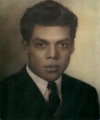 |
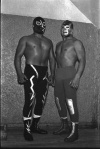 |
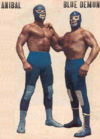 |
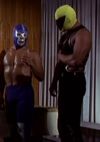 |
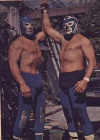 |
 |
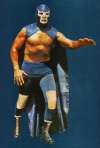 |
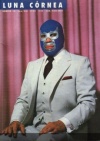 |
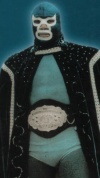 |